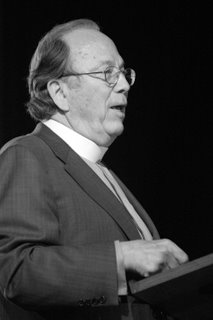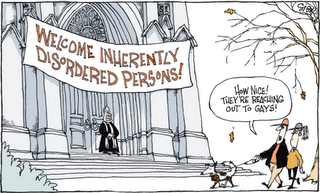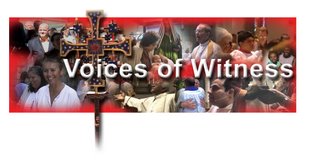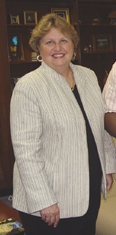My, my, my ... And after you've read this, don't miss Fr. Jake's great commentary on this latest episode of "As The Anglican World Turns"From Bishop John David Schofield of San Joaquin
A MESSAGE FROM YOUR BISHOP ABOUT THE 47th ANNUAL CONVENTION
Constitutional amendments are being offered at the Diocese's 47th Annual Convention on December 1-2,2006, which are designed to preserve our place in the Anglican Communion but which will eventually alter our relationship with The Episcopal Church (TEC). The 47th Annual Convention will be a test of where we as a diocese stand. The worldwide Anglican Communion will be watching to see how we vote.
Do we recognize Holy Scripture as authoritative? Will we follow the Lord? Will we be leaders to
disenfranchised Anglicans across the country? Our actions at the 47th Annual Convention will answer these questions for the entire world. As your Bishop, I ask you prayerfully to consider the information below and to prepare yourselves to vote your faith through your clergy and delegates to the Annual Convention on December 1 - 2,2006.
The Spiritual Crisis In The Episcopal Church. Much has been said and written about the controversy over the revisionist teachings of TEC. The truth is that TEC (1) denies the unique divinity of Jesus Christ and (2) takes a position on human sexuality which undercuts marriage and is destructive to the family unit designed by God and revealed in Scripture. These are not positions and teachings which are merely "revisionist" or "liberal." These are positions of those who have abandoned the Christian faith.
Jesus says in the Bible that "I am the way and the truth and the life. No one comes to the Father except through me." ( John 14:6) This is a cornerstone of the Christian faith and Anglican worship. It is what we believe in the Diocese of San Joaquin. It is our mission, and that of the
Church, to bring all people into a relationship with God through Jesus Christ.
TEC at GC 2006 refused to pass a resolution endorsing John 14:6. By extension, TEC questions the validity and authority of Holy Scripture. According to the leadership of TEC, Jesus simply represents one of many ways of coming to a relationship with the Father. According to the leadership of TEC, the mission of the Church is "social justice" and "world peace" and not the Great Commission as set forth in Matthew 28.
TEC's unrepentant adherence to these heresies has wrought havoc within the American Church and throughout the world-wide Communion. At least 22 of the 38 provinces of the Anglican Communion have declared impaired or broken communion with TEC. Vast numbers of faithful Anglicans have left and continue to leave TEC on a daily basis. Major parishes across the country have left and continue to leave in record numbers. (We are not immune in this Diocese having lost one parish already.) The statistics are staggering and clearly demonstrate that TEC is disintegrating. This is not surprising given that TEC has chosen to walk apart from the Christian faith.
Does This Spiritual Crisis Really Affect Us? You already know the answer to this question: it's "YES". Heresy is insidious by nature and, over time, the victim becomes desensitized to its effects. There are four recognizable stages from prolonged exposure. Initially, there is condemnation of the heresy; then it is tolerated; then it is accepted; and, finally, it is practiced. TEC is currently preaching and practicing heresy and the majority of TEC's leadership will not repent as evidenced by, among other things, TEC's refusal to comply with the Windsor Report. Continuing in communion with TEC poses a clear and present danger to the spiritual health of the Diocese and its parishioners. TEC's continued membership in the Anglican Communion is tenuous and excommunication or isolation is a reality which, in turn, threatens the Diocese's place in the Anglican Communion. We must remember, we are Anglicans first and Episcopalians second.
What Does Scripture Tell Us To Do? When faced with unrepentant and public false teaching, Scripture is very, very clear. Christians are called to withdraw from Eucharistic fellowship. There are many biblical references directly on point, among them: "If anyone comes to you bringing a different doctrine, you must not receive him in your house or even give him a greeting. To greet him would make you a partner in his wicked work." (I1 John, 10-1 1. Also Mt. 8: 17, I Cor. 5:11-13, Gal. 1:8, 2 Thes. 3:6, Rev. 2:20; BCP, p. 409.)
What Will The Constitutional Amendment Do? The proposed constitutional amendment will reaffirm our commitment to the historic Anglican Faith and our membership in the Anglican Communion and our relationship with the Archbishop of Canterbury without having any direct ties to The Episcopal Church. We will continue to worship in the historic Anglican tradition as we have for the past 100 years and without fear that the actions of TEC will disenfranchise us from the rest of the Communion
What Changes Will You See If The Amendment Passes? First, you will be surprised by the changes you will not see. You will see no change in the worship services; they will follow the historic Anglican Faith as they always have. The prayer book and hymnals will remain the same. You will worship and attend services in the same buildings. Your clergy will remain the same. Best of all, Holy Scripture will continue to be our ultimate authority. What will change? The flag; the word "Episcopal" will most likely be replaced with the word "Anglican;" Our delegates and clergy will not attend the TEC General Convention.
On the other hand, the Diocese could experience rapid growth if the amendment passes. For example, there are many large parishes in southern California which have seceded from TEC
and have expressed interest in affiliating with an Anglican diocese headed by an American bishop. Initial discussions with a number of priests and parishes indicate a desire to find a way to become part of an orthodox diocese in Communion with the rest of the Anglican world and with the rchbishop of Canterbury.
Is Our Place In The Anglican Communion Assured? Yes. First, we have a commitment from the Southern Cone (Archbishop Greg Venebles) that the bishops of his dioceses are open to our joining their Province. Second, the Global South, representing 80 percent of the Anglican Communion, issued a public statement known as "The Kigali Communique" in which it pledged to "take initial steps toward the formation of what will be recognized as a separate ecclesiastical structure of the Anglican Communion in the USA."
Diocesan representatives have been invited to meet with Primates of the Global South November 15-17, 2006, to begin work on this plan. The Diocese could be the vanguard of a new 39th Anglican Province in North America. At present, there are seven or more dioceses lined up behind us waiting to follow our leadership example.
Are There Risks? Yes, of course. TEC is highly litigious and will likely file lawsuits in the California state courts seeking to take our property away. Our lawyers tell us we can successfully defend ourselves but there are risks inherent in any litigation. There will be significant costs of defending such lawsuits. However, property considerations are, and should
be, secondary to our spiritual salvation and well being. Ours is a spiritual decision which should not be driven by property issues. We can seek guidance from the parable of the rich young man in Matthew 19:16-22.
Is there risk to our clergy? There has been considerable risk to me which is one reason why the release of this information comes just a few weeks before our Annual Convention. If you have been following the news, you know that standing strong for the Lord subjects one to reprisals and persecution from the leadership of TEC. I have been repeatedly threatened for my ppposition to the heresy of the American Church. Formal charges were levied against me this summer by four California bishops. Immediately after a clergy wide meeting this October about the proposed constitutional amendment, the chancellor to the Presiding Bishop, David Beers, phoned and threatened to take action against me and Diocese. Clergy concerns over pensions they have been accruing are real.
Yet, those with pensions of five years or more have vested (or protected) insurance against losing anything that is already due to them. Those who have been with the Pension Plan of the Church fewer than five years may be surprised to learn that other financial institutions are prepared to offer similar plans with a vesting taking place from the first day of participation. Clergy already assured of pensions that could be capped at the present level would also be able to add to their pensions in a new plan.Equally, medical insurance as well as dental plans will be made available to clergy and lay employees.
It is all of you who will be voting your faith on December 1 and 2.
+John-David
 What a nice surprise this morning to find an early Christmas present in my email inbox: the long awaited "clarity" on the "Alternative Primatial Oversight" issue. It is a proposal steeped in classic Anglican both/and ... protecting the integrity of the polity of the Episcopal Church and offering a pastoral response to those who hold a minority theological opinion. And the language "in consultation with the Archbishop of Canterbury" -- given that Kenneth Kearon was at the table for both the September and November meetings -- clearly indicates Canterbury "buy in" and perhaps ... just perhaps ... an end to the schimatic-generated fantasy that +Rowan was going to sweep in and vote TEC off the Anglican Island.
What a nice surprise this morning to find an early Christmas present in my email inbox: the long awaited "clarity" on the "Alternative Primatial Oversight" issue. It is a proposal steeped in classic Anglican both/and ... protecting the integrity of the polity of the Episcopal Church and offering a pastoral response to those who hold a minority theological opinion. And the language "in consultation with the Archbishop of Canterbury" -- given that Kenneth Kearon was at the table for both the September and November meetings -- clearly indicates Canterbury "buy in" and perhaps ... just perhaps ... an end to the schimatic-generated fantasy that +Rowan was going to sweep in and vote TEC off the Anglican Island.

















